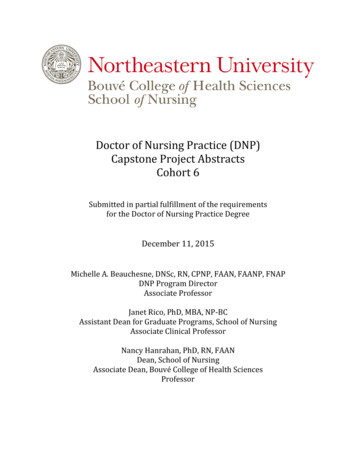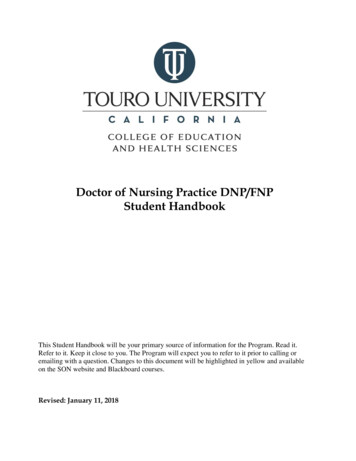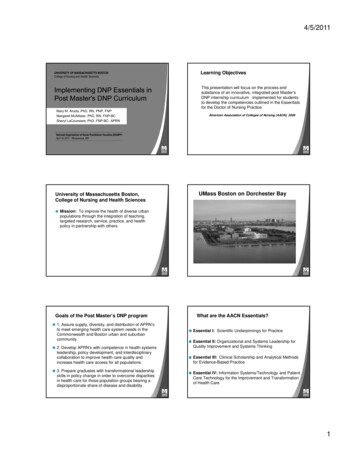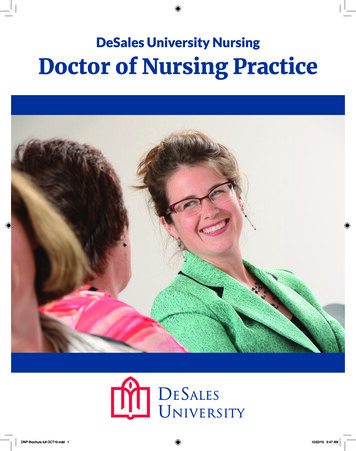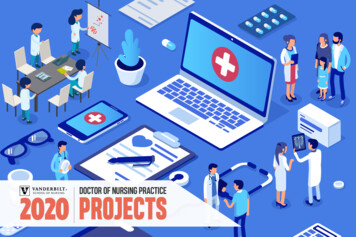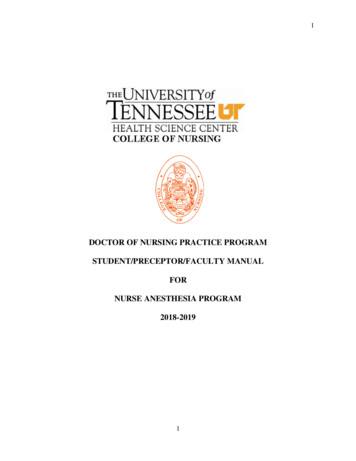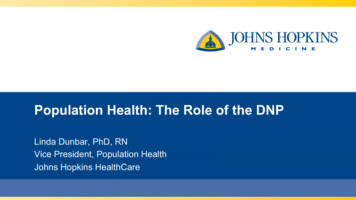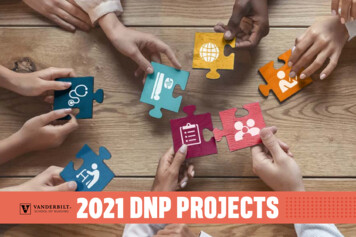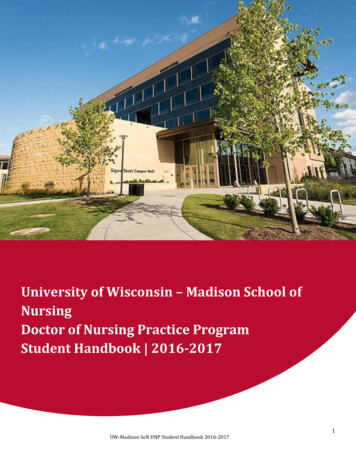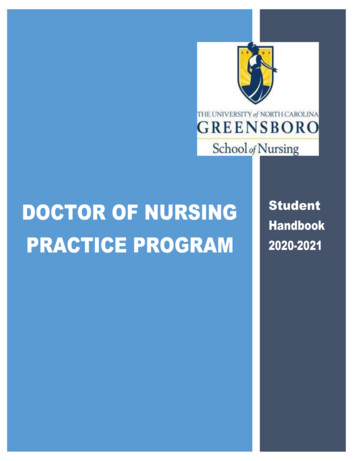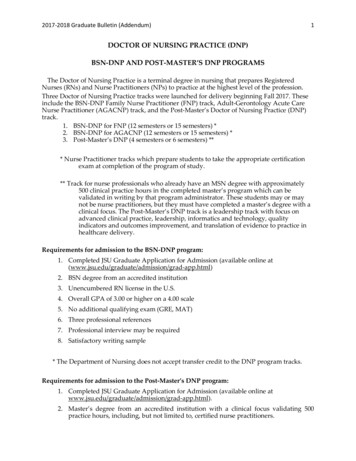
Transcription
2017-2018 Graduate Bulletin (Addendum)1DOCTOR OF NURSING PRACTICE (DNP)BSN-DNP AND POST-MASTER’S DNP PROGRAMSThe Doctor of Nursing Practice is a terminal degree in nursing that prepares RegisteredNurses (RNs) and Nurse Practitioners (NPs) to practice at the highest level of the profession.Three Doctor of Nursing Practice tracks were launched for delivery beginning Fall 2017. Theseinclude the BSN-DNP Family Nurse Practitioner (FNP) track, Adult-Gerontology Acute CareNurse Practitioner (AGACNP) track, and the Post-Master’s Doctor of Nursing Practice (DNP)track.1. BSN-DNP for FNP (12 semesters or 15 semesters) *2. BSN-DNP for AGACNP (12 semesters or 15 semesters) *3. Post-Master’s DNP (4 semesters or 6 semesters) *** Nurse Practitioner tracks which prepare students to take the appropriate certificationexam at completion of the program of study.** Track for nurse professionals who already have an MSN degree with approximately500 clinical practice hours in the completed master’s program which can bevalidated in writing by that program administrator. These students may or maynot be nurse practitioners, but they must have completed a master’s degree with aclinical focus. The Post-Master’s DNP track is a leadership track with focus onadvanced clinical practice, leadership, informatics and technology, qualityindicators and outcomes improvement, and translation of evidence to practice inhealthcare delivery.Requirements for admission to the BSN-DNP program:1. Completed JSU Graduate Application for Admission (available online at(www.jsu.edu/graduate/admission/grad-app.html)2. BSN degree from an accredited institution3. Unencumbered RN license in the U.S.4. Overall GPA of 3.00 or higher on a 4.00 scale5. No additional qualifying exam (GRE, MAT)6. Three professional references7. Professional interview may be required8. Satisfactory writing sample* The Department of Nursing does not accept transfer credit to the DNP program tracks.Requirements for admission to the Post-Master’s DNP program:1. Completed JSU Graduate Application for Admission (available online atwww.jsu.edu/graduate/admission/grad-app.html).2. Master’s degree from an accredited institution with a clinical focus validating 500practice hours, including, but not limited to, certified nurse practitioners.
2017-2018 Graduate Bulletin (Addendum)3. Unencumbered RN license in the U.S.4. Overall GPA of 3.00 or higher on a 4.00 scale5. No additional qualifying exam (GRE, MAT)6. Three professional references7. Professional interview may be required9. Satisfactory writing sample* The Department of Nursing does not accept transfer credit to the DNP program tracks.Graduation requirements are as follows:1. Completion of courses required for the selected pathway:a. 69 credit hours must be completed for the BSN-DNP.b. 36 credit hours must be completed for the Post-Master’s DNP.2. Completion of supervised academic program practice hours:a. 1330 hours must be completed for the BSN-DNP.b. 630 hours must be completed for the Post-Master’s DNP.3. Satisfactory completion of DNP project and paper.4. Satisfactory completion of professional electronic portfolio.5. Satisfactory completion of comprehensive exam for the BSN-DNP specialty tracks.Progression and RetentionDNP students must maintain a 3.0 GPA. If GPA falls below 3.0, student will be placed onacademic probation per policy of the Department of Graduate Studies. A maximum of twocourses with a grade of "C" may be counted toward degree completion and graduation.However, only one C is permitted in a support or specialty course. A second C in a support orspecialty course must be repeated. A course may be repeated only once. A student earning athird C or lower may be dismissed from the DNP program.DOCTOR OF NURSING PRACTICETRACK: ADULT-GERONTOLOGY ACUTE CARE NURSE PRACTITIONERRequired Courses (69 semester hours):NU 607NU 613NU 620ANP 668ANP 669Advanced Health Assessment (3)Physio-Pathological Basis of Advanced Nursing (3)Pharmacology for Advanced Practice Nurses (3)Advanced Adult Gerontology Acute NP I (3)Advanced Adult Gerontology Acute NP Practicum I (1)(70 Clinical Practicum Hours)2
2017-2018 Graduate Bulletin (Addendum)ANP 671ANP 672ANP 673ANP 674ANP 675ANP 676ANP 677NU 702NU 707NU 708NU 710NU 711NU 712NU 713NU 715NU 716ANP 796ANP 797ANP 798ANP 799Health Promotion/Disease Prevention and Issues for AGANP (2)Advanced Adult Gerontology Acute NP II (3)Advanced Adult Gerontology Acute NP Practicum II (3)(210 Clinical Hours)Advanced Adult Gerontology Acute NP III (3)Advanced Adult Gerontology Acute NP Practicum III (3)(210 Clinical Hours)Advanced Adult Gerontology Acute NP IV (3)Advanced Adult Gerontology Acute NP Practicum IV (3)(210 Clinical Hours)BSN-DNP Online Orientation (0)Scientific Underpinnings of Advanced Nursing Practice (3)Evidence-Based Practice and Quality Improvement in Healthcare (3)Health Care Policy and Finance (3)Biostatistics and Translating Evidence (3)Clinical Prevention & Population Health (3)Organizational and Systems Leadership for APN (3)Innovative Leadership and Collaboration in Healthcare (3)Interprofessional Healthcare and Informatics (3)AGANP Project Planning and Development (3)AGANP Residency I (3)(210 Practicum Hours)AGANP Residency II (3)(210 Practicum Hours)AGANP Clinical Residency III (3)(210 Practicum Hours)69 Semester Hours Required for this DegreeNote: An individual plan of study is provided from the Director of Student Services at time ofadmission.3
2017-2018 Graduate Bulletin (Addendum)DOCTOR OF NURSING PRACTICETRACK: FAMILY NURSE PRACTITIONERRequired Courses (69 semester hours):NU 607NU 613NU 620FNP 668FNP 669FNP 671FNP 672FNP 673FNP 674FNP 675FNP 676FNP 677NU 702NU 707NU 708NU 710NU 711NU 712NU 713NU 715NU 716FNP 796FNP 797FNP 798FNP 799Advanced Nursing Assessment (3)Physio-pathological Basis of Advanced Nursing (3)Pharmacology for Advanced Practice Nurses (3)Advanced Family NP I (3)Advanced Family NP Practicum I (1)(70 Clinical Practicum Hours)Health Promotion/Disease Prevention and Issues for FNP (2)Advanced Family NP II (3)Advanced Family NP Practicum II (3)(210 Clinical Hours)Advanced Family NP III (3)Advanced Family NP Practicum III (3)(210 Clinical Hours)Advanced Family NP IV (3)Advanced Family NP Practicum IV (3)(210 Clinical Hours)BSN-DNP Online Orientation (0)Scientific Underpinnings of Advanced Nursing Practice (3)Evidence-Based Practice and Quality Improvement in Healthcare (3)Health Care Policy and Finance (3)Biostatistics and Translating Evidence (3)Clinical Prevention and Population Health (3)Organizational and Systems Leadership for APN (3)Innovative Leadership and Collaboration in Healthcare (3)Interprofessional Health Care and Informatics (3)FNP Project Planning and Development (3)FNP Clinical Residency I (3)(210 Specialty Clinical Hours)FNP Clinical Residency II (3)(210 Specialty Clinical Hours)FNP Clinical Residency III (3)(210 Specialty Clinical Hours)69 Semester Hours Required for this DegreeNote: An individual plan of study is provided from the Director of Student Services at time ofadmission.4
2017-2018 Graduate Bulletin (Addendum)DOCTOR OF NURSING PRACTICETRACK: POST MASTER’S DNPRequired Courses (36 semester hours):NU 701NU 707NU 708NU 710NU 711NU 712NU 713NU 715NU 716DNP 796DNP 797DNP 798DNP 799Post Master’s DNP Online Orientation (0)Scientific Underpinnings of Advanced Nursing Practice (3)Evidence-Based Practice and Quality Improvement in Healthcare (3)Health Care Policy and Finance (3)Biostatistics and Translating Evidence (3)Clinical Prevention and Population Health (3)Organizational and Systems Leadership for APN (3)Innovative Leadership and Collaboration in Healthcare (3)Interprofessional Health Care and Informatics (3)DNP Project Planning and Development (3)DNP Residency I (3)(210 Practicum Hours)DNP Residency II (3)(210 Practicum Hours)DNP Residency III (3)(210 Practicum Hours)36 Semester Hours Required for this DegreeNote: An individual plan of study is provided from the Director of Student Services at time ofadmission.5
2017-2018 Graduate Bulletin (Addendum)6DOCTOR OF NURSING PRACTICE CORE COURSES (NU)The following courses are NU prefix core courses taken by DNP students in all tracks:701.702.707.708.710.711.712.Post-Master’s DNP Orientation (0). The purpose of the course is to introduce the newdoctoral nursing student to expectations and responsibilities for successful progressacross the DNP curriculum and integration into the JSU Nursing community of learners.Topics covered will include content such as introduction to faculty and staff, technologyrequirements, scholarly writing attributes, learning management system, professionalbehaviors in online environment, immersions, document tracking, etc.). *Specific to PostMaster’s trackBSN-DNP Online Orientation (0). The purpose of the course is to introduce the newdoctoral nursing student to expectations and responsibilities for successful progressacross the DNP curriculum and integration into the JSU Nursing community of learners.Topics covered will include content such as introduction to faculty and staff, technologyrequirements, scholarly writing attributes, learning management system, professionalbehaviors in online environment, immersions, document tracking, etc.). *Specific to NPtracksScientific Underpinnings of Advanced Nursing Practice (3). The purpose of this coursefor the MSN/DNP student is to explore the scientific underpinnings that define the natureof health and healthcare delivery and to provide the basis for practice at the highest levelof nursing from a theoretical perspective. Conceptual models and theories reflectingsynthesis of knowledge from nursing and other disciplines are evaluated. The structureand nature of current theoretical knowledge as a guide for advanced nursing practice atthe patient, population or system level of care are explored.Evidence-Based Practice and Quality Improvement in Healthcare (3). The purpose ofthis course is to provide the MSN/DNP student with the foundational componentsrequired for effective utilization of evidence-based practice within the scope of advancednursing practice. The course focuses on the acquisition of evidence-based practicemethods to critically appraise existing literature, synthesize, and implement the bestevidence for practice. The course emphasis is on the application of quantitative,qualitative, and quality improvement methodologies to promote safe, effective carewithin healthcare systems.Health Care Policy and Finance (3). The purpose of this course for the MSN/DNPstudent is to develop advanced nursing leaders who have the knowledge and skills todesign, analyze, influence, and implement policies that frame health care financingpractice regulation, access, safety, quality, and efficacy. The course focuses on majorcontextual factors and policy triggers that influence health policy making at variouslevels. Principles of finance, business, and health care economics will be presented. Thecourse emphasis is on developing essential competencies in health care policy advocacyand health care financing.Biostatistics and Translating Evidence (3). The purpose of this course for the MSN/DNPstudent is to provide the methodological basis for translating evidence into practicesystems and to provide an overview of sources of data, data collection, datamanagement, analysis, and evaluation of research findings, with a focus on biostatisticalanalysis as a base for evidence-based practice in nursing. Course concepts will include avariety of biostatistical analyses with the primary focus on correct interpretation and useof quantitative methods in advanced nursing practice.Clinical Prevention and Population Health (3). The purpose of this course for theMSN/DNP student is to explore the complex issues surrounding population health at the
2017-2018 Graduate Bulletin (Addendum)713.715.716.7local, regional, national, and global level. Students focus on current health issues andtrends by utilizing foundation knowledge and theoretical approaches to identifyingstrategies to eliminate health disparities in diverse organizational cultures and selectpopulations of interest. Students develop and evaluate approaches to health care deliverythat address and support the needs of diverse populations while focusing on healthpromotion, illness prevention, quality/safety and diversity. Leading Health Indicatorsfrom Healthy People 2020 serve as a guide for the identification of at-risk groups and areincorporated into the completion of projects geared toward improving the health ofindividuals, aggregates and populations.Organizational and Systems Leadership for the Advanced Practice Nurse (APN) (3).The purpose of this course for the MSN/DNP student is to explore the use of innovativeleadership initiatives to build an organizational culture that will support the future ofhealthcare. Desirable attributes and traits of effective leaders in complex, ever-changinghealthcare organizations are discussed. The ideas of organizational and systemsleadership are appraised. Content assists students in identifying the knowledge, skillsand abilities for successful transition as leaders in high reliability organizations. Theimportance of self-awareness and self-reflection are highlighted as a method of creating aculture of high performance with accountability. Effective communication techniques,successful conflict resolution and effective problem solving practices within highreliability organizations are explored. Emphasis is placed on shared governance,maximizing teamwork and inspiring team members to share in organizational visionsand goals. Strategic planning is discussed as an avenue to measure leadership andorganizational success.Innovative Leadership and Collaboration in Healthcare (3). The purpose of this coursefor the MSN/DNP student is to explore key concepts of innovative leadership as studentsdevelop an appreciation for the knowledge, skills and attributes required to engageteams in creative, evidence-based initiatives. In-depth exploration of the leader’s primaryrole in successful organizational change is emphasized. Students cultivate theknowledge, skills and abilities to apply to authentic, innovative leadership to anidentified practice issue. The ideas of collaborative partnerships and teamwork areexplored as effective strategies to improve healthcare outcomes for individuals andaggregates. Organizational culture and the influence of values are closely examined asfactors influencing successful change. Students discover the importance of effectivecommunication, successful collaboration, and team building to the process of change. Theidea of executing meaningful performance conversations is emphasized as a strategy forpreparing the MSN/DNP student for advanced roles in leading change. Models of qualityimprovement and project planning, implementation, and evaluation are also examined.*(Pre-requisite - NU713)Interprofessional Health Care and Informatics (3). The purpose of this course is toprepare the MSN/DNP student to be proficient in the evaluation and use of technologyand information systems appropriate to specialized areas of advanced nursing practice.The course focuses on information systems and current technology in the management ofhealthcare outcomes. Within the course, emphasis is placed on the use of informationsystems and technology based resources to support interprofessional and collaborativeclinical and administrative decision making to transform healthcare.SUPPORTING COURSES FOR BSN-DNP SPECIALTY TRACKSThe following courses are NU prefix supporting courses taken by BSN-DNP students in theNP tracks; they consist of the 3 P’s (advanced pathophysiology, advancedpharmacology, and advanced physical assessment):
2017-2018 Graduate Bulletin (Addendum)607.613.620.8Advanced Health Assessment (3). The purpose of this course is to provide theknowledge necessary to perform comprehensive history, physical, and psychologicalassessments of signs and symptoms, pathophysiologic changes, and psychosocialvariations of the patient across the lifespan. The focus of the course is to providefoundational materials for specialized areas of advanced nursing practice. The emphasisis on systematic data collection, diagnostic reasoning, and clinical problem-solving.Physio-pathological Basis of Advanced Nursing (3). The purpose of this course is toprovide an analysis of pathophysiology in frequently encountered conditions across thelife span and in special populations. The focus is to introduce pathophysiological theoriesand research as a basis for advanced nursing practice. The emphasis is on appliedphysiology and pathophysiology to enable advanced practice nurses to understand howand why the clinical manifestations of disease occur so that appropriate therapies can beselected.Pharmacology for Advanced Practice Nurses (3). The purpose of this course is to prepareadvanced practice nurses with knowledge of pharmacokinetics andpharmacotherapeutics of common drug categories used to prevent illness, and to restoreand maintain health for client systems across the life span. The focus is on mechanismsof action, pharmacologic response, usual doses, adverse effects, indications, interactions,compatibilities, contraindications and routes of administration are emphasized in acuteand chronic conditions. The unique characteristics of special populations related totherapeutic needs, as well as drug absorption, metabolism and excretion are defined. Theemphasis of this course is to serve as the basis for development of further knowledge andprinciples to be applied to select specialty option populations within subsequent courses.(Prerequisite NU 613)*NU607, NU613, and NU620 are pre-requisites to all FNP or ANP specialty track courses.FAMILY NURSE PRACTITIONER SPECIALTY COURSES (FNP)The following courses are FNP prefix courses taken by DNP students in the FNP track:668.669.Advanced Family NP I (3). The purpose of this course is to integrate basic knowledge ofhuman anatomy and physiology with an understanding of the pathologic changes andclinical manifestations that characterize common, acute, chronic, and complex disordersin pediatric, adult, obstetric and geriatric clients. The focus of this course is on thedevelopment of critical thinking skills necessary to achieve direct care and corecompetencies of the family nurse practitioner. The emphasis of this course is on theacquisition of the knowledge and skills necessary to deliver safe and effective care topediatric, adult, obstetric and elderly populations. (Prerequisites: NU 613, NU 620, NU607) (Co-requisites: FNP 669, FNP 671)Advanced Family NP Practicum I (1). The purpose of this course is to demonstratemanagement strategies and apply selected practice models for the delivery of highquality care to pediatric, adult, obstetric and elderly populations. The focus of this courseis on the delivery of health care services to the family. The emphasis of this course is onpromoting the progression of competence within the Advanced Practice Nursing role. (70Clinical Practicum Hours) (Prerequisites: NU 613, NU 620, NU 607) (Co-requisites: FNP668, FNP 671)
2017-2018 Graduate Bulletin (Addendum)671.672.673.674.675.676.9Health Promotion/Disease Prevention and Issues for FNP (2). The purpose of thiscourse is to integrate prior theoretical and practical knowledge for diagnoses andmanagement of health and illness pediatric, adult, obstetric and geriatric populations.The focus of this course is application of health promotion lifestyle changes, diseaseprevention concepts and genetic screening options in pediatric, adult, obstetric andgeriatric populations. The emphasis of this course is to examine clinical preventiveservices and health promotion in pediatric, adult and geriatric populations.(Prerequisites: NU 613, NU 620, NU 607) (Co-requisites: FNP 668, FNP 669)Advanced Family NP II (3). The purpose of this course is to continue to integrate basicknow
DOCTOR OF NURSING PRACTICE (DNP) BSN-DNP AND POST-MASTER’S DNP PROGRAMS The Doctor of Nursing Practice is a terminal degree in nursing that prepares Registered Nurses (RNs) and Nurse Practitioners (NPs) to practice at the highest level of the profession. Three Doctor of Nursing Practice tra
